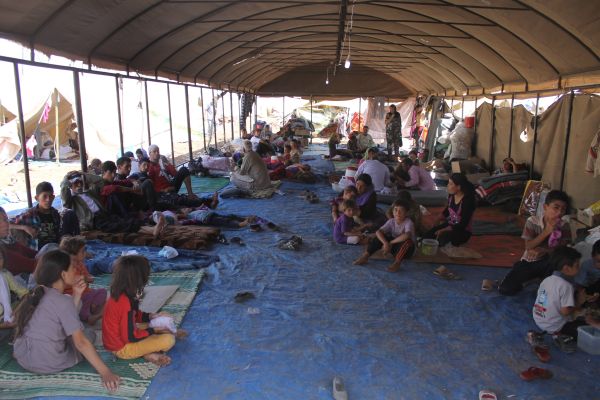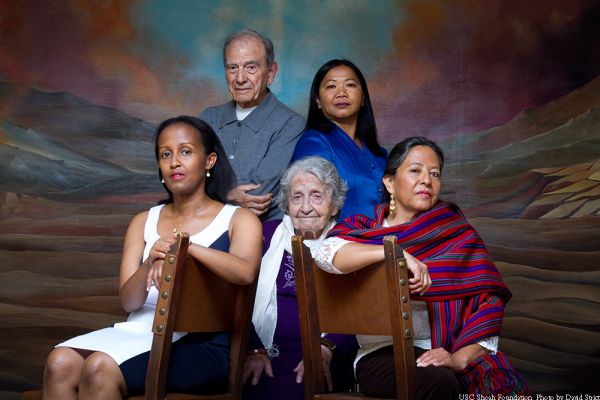Remembering and Recognizing Genocide
April is Genocide Awareness Month, a time to reflect on atrocities of the past while ensuring that we avoid acts of mass murder in the future. The urgency of this mandate was highlighted just weeks ago when the U.S. House of Representatives and the State Department officially recognized that ISIS is committing genocide in the Middle East.

ISIS has massacred hundreds, trapped tens of thousands without food or water, and captured, enslaved, sold, and raped thousands of women and girls. ISIS targets and attacks Christians, Yezedis (Yazedis), and Shia Muslims for who they are. U.S. Secretary of State John Kerry noted that “its entire worldview is based on eliminating those who do not subscribe to its perverse ideology. There is no question in my mind that if (ISIS) succeeded in establishing its so-called caliphate, it would seek to destroy what remains of ethnic and religious mosaic once thriving in the region.”
USC Shoah Foundation’s model is to use testimony from genocide survivors to show that we all have a role to play in intervening in the cycle that leads to mass murder. It is a modern, urgent role, as genocide is happening on our watch.
Genocide is never the same thing twice, but its consequences for the victims and the survivors are chillingly similar. Comparing human suffering between one genocide and another serves no purpose and to my knowledge there is no meter for human pain. We cannot take on the suffering of another, but we can acknowledge it and in so doing share the burden.
“Never again” has been said in earnest and with the best of intentions, for the best part of three quarters of a century. But it starts to ring hollow when intent is not followed by action. The first action is acknowledgement that genocide is underway, because once you state it, you cannot take it back, and it comes with a moral imperative to act.
The right time to name genocide is when you can do something to prevent it.
In 1948, the United Nations instituted the Convention for Punishment and Prevention of Genocide for critical reasons. First, they wanted to name what had just happened to the Jews, and several other groups, during World War II. Second, they wanted to provide a globally recognized identity for a crime that until then, had no legal definition and was therefore difficult to identify. Third, they wanted the convention to provide a framework to end impunity. Unfortunately, the convention had no teeth, so it was only a matter of time before Cambodia, Guatemala, Rwanda, and other genocides were occurring with little or no intervention.
The Genocide Convention states that genocide is occurring when a national, ethnic, racial or religious group is sufficiently targeted that it is clear that the group is no longer required or wanted under the jurisdiction of the ruling power. It has specific provisions, such as killing members of the group, causing serious bodily or mental harm, inflicting condition calculated for physical destruction of the group, preventing births, and removing children.

The righ time to name genocide is when you can do something to prevent it. Unfortunately, we are now in a position to add a whole new category of victims to USC Shoah Foundation’s Visual History Archive: Muslims and Christians whose lives are in danger from the genocidal ideology of ISIS right now. Different time. Different place. Similar human pain.
I am reminded that in the Archive, there are many testimonies of individuals who, in the face of genocide, took it upon themselves to make small differences. The horror and suffering they speak of are unimaginable, but even in the darkness they found shafts of light, of human decency, kindness and courage. These illuminations of humanity survive the genocidal madness of the killers themselves. By preserving the witnesses’ stories, and showing that one person can make a difference, we encourage ourselves and our learners to be people of conscience.
Just as we are closer through USC Shoah Foundation testimony to people of Armenia, Nanjing, Guatemala, Cambodia, Rwanda, and the Holocaust, technology has brought us closer than ever to the people in Syria and Iraq. We are all in each other’s globalized backyard. We are closer to the people who are suffering and to the global institutions that can make a difference. The question is how we will use our conscience and our voice, to speak out, before it is too late.